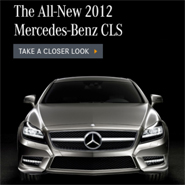- About
- Subscribe Now
- New York,
October 5, 2011

Luxury brands Mercedes-Benz, BMW and Louis Vuitton topped the luxury sector’s list of global brands in 2011, according to a report from Interbrand.
The brands on the top 100 list were ranked on financial performance of branded products or services, the role of the brand in purchase decision process and the strength of the brand to continue to secure earnings. Other luxury brands such as Gucci, American Express, Audi, Hermes, Cartier, Tiffany & Co., Armani, Burberry and Ferrari made the cut.
“I think that it would be fair to say that once again luxury has performed extremely well,” said Jez Frampton, global CEO of Interbrand, New York.
“Post-credit crunch three years ago, everyone speculated that luxury brands would suffer, but they have fared well because they have focused on quality and productivity and keeping their core values,” he said.
“There has also been a swirling focus on authenticity, and that’s what luxury brands are about.”
Brands such as Coca-Cola, IBM, Microsoft, Google and General Electric were the top five brands.
Driving sales
Mercedes was the highest-ranked luxury brand in 12th place.
The brand can attribute its success to its “Best or Nothing” campaign that tied its long heritage of excellence in engineering, performance, styling and safety to its 125th birthday, per the study.
Mercedes' best or nothing campaign
Mercedes outranked all other automotive brands in terms of customer loyalty and satisfaction.
The second highest-ranked luxury brand was BMW in 15th place.
BMW may have placed lower in the study because of its significant amount of negative responses to the overall design of the 1-Series, per the study.
However, the brand is attempting to highlight its performance and efficiency via sponsors such as the London Olympics and Team USA next year, as well as tapping its network of 5.5 million Facebook fans and considerable Twitter and YouTube followers.
Additionally, its BMW Guggenheim Lab, which addresses issues of urban life through programs and public discourse, has received a positive consumer response, per the study (see story).
BMW's Guggenheim Lab
The luxury brands that appeared in the report were able to increase their respective brand values by striking a delicate balance between leveraging their iconic status and simultaneously engaging new consumers in unique and relevant experiences.
Other luxury brands such as Gucci were ranked at No. 39, while Burberry was ranked No. 95 in the study. Is this a bad sign?
“Some of it has to do with volume," Mr. Frampton said. "By nature, [luxury brands] have a high ticket price and lower volume.
“The whole point about luxury is that it is an exclusive club,” he said. “I think where they make it back is that they are highly profitable because you are paying for access into a club.
“Louis Vuitton is No. 18 and makes $23 billion. Any brand that gets into the top 100 is really good at it because it’s the top 100 brands in the world and they are really to be commended.”
Luxury comeback
Despite that only a handful were on the Interbrand Top 100 list, Mr. Frampton believes that luxury brands are gaining strength.
“I think we all have seen a real return of core values – authenticity, craftsmanship, quality of product, maintaining price points and not diluting the offer,” Mr. Frampton said.
“I think the credit crunch reminded luxury brands about what they were really about and what luxury actually meant and what people wanted from them,” he said.
Furthermore, brands such as Prada, Bulgari and Lexus were ranked right above 100.
One brand that did especially well was Burberry, per Mr. Frampton.
Burberry campaign
Burberry increased its brand value 20 percent, making it one of the top risers in the report this year.
The British retailer focused its core competencies on fashion, digital innovation and global expansion, according to the study.
Luxury brands that wish to rise to the top of the list are encouraged to understand and emphasize core values such as craftsmanship and authenticity.
“I think really understanding the core of what you are about is absolutely key in luxury because consumers are buying not just a piece of craftsmanship and authenticity -- there is a statement that goes with it as well,” Mr. Frampton said.
“The better you understand this and are able to articulate that across digital, in-store experiences and products, the better able you are to understand it in all different values, [and this] is what can improve a luxury brand’s ranking,” he said.
Please click here to view the list of top 100 global brands.
Kayla Hutzler reported on this article.
Final Take
Rachel Lamb, associate reporter on Luxury Daily, New York
Share your thoughts. Click here